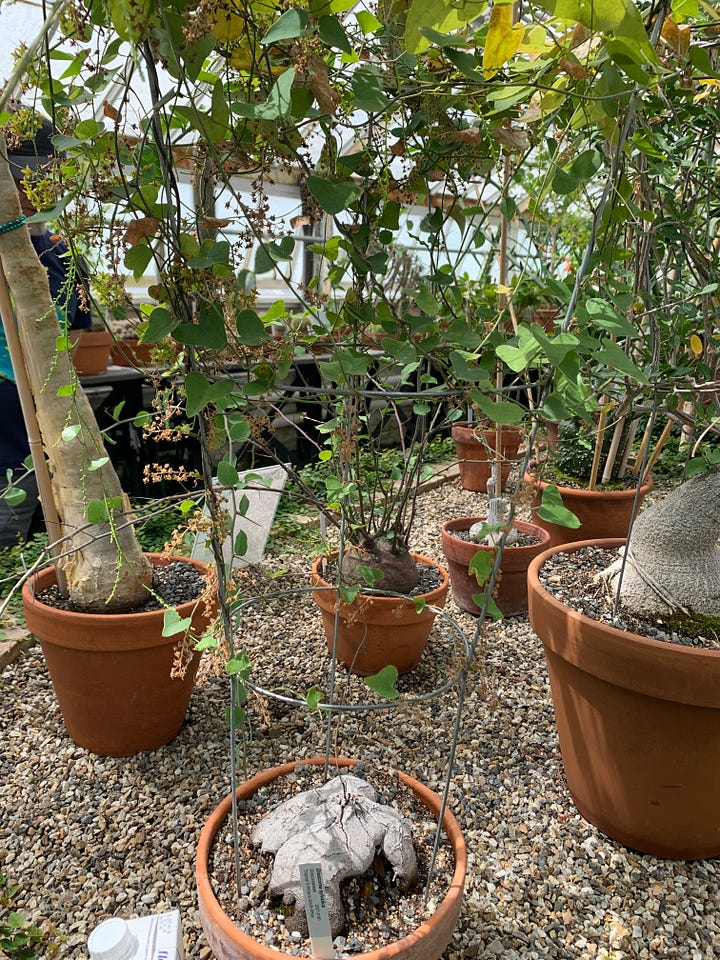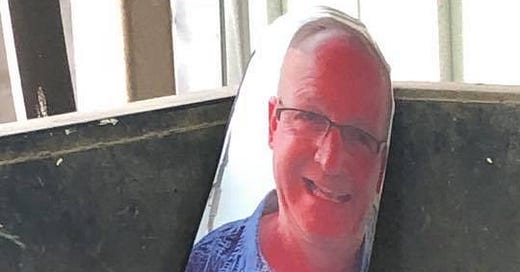Hi friends,
After more than two years, I’m excited to let some new fiction out of my living room! My short story “Man Next Door” came out yesterday in Short Story, Long. Though all my writing is special to me, this piece has been occupying an extra special place. It was inspired by a found object that played on my imagination for years before I wrote about it, and it grew out of a flash fiction story to then become part of a triptych.
The found object, which a friend posted on Facebook, was . . . Well, maybe I should just show you:
Enough said, right?
The three pieces of the triptych are my flash fiction story “Our Man” (Hobart, 2021), in which our inflatable dad-guy helps the narrator discover the joy of exploring their nonbinary gender; “Man Next Door,” in which balloon dad challenges Maddy to own her burgeoning feminine and queer strength; and a novella-in-progress that takes the dad in a surprising direction.
The other reason why these pieces are so special to me is because they’ve been coming from a more confident place. Now that I’ve been writing for a long while and I’m firmly into middle age, I’m realizing how much easier it’s been to let go of the inner editor that thinks it has a monopoly on what makes good literature. I’m enjoying this confidence because, frankly, it’s making writing a lot more fun.
Recently, I was in Northampton, MA, at the Smith College Botanic Garden, and I saw a plant that illustrated perfectly how my mind has changed about writing. For years I believed that if good writing were a plant, it would start with deep, solid roots, grow a thick, healthy stem, and blossom into a lush, perfectly pruned thing of beauty. Then I met this guy:


Look at that singular, wimpy little stem, no thicker than a wire. It doesn’t know or care what anyone expects it to look like; it’s just busy growing all its delicate leaves in whatever directions it wants, leaving it to us humans to create order out of it with our stakes. If you’ll forgive the extended metaphor, these days my stories tend to be like that plant. They often start with a small, undeveloped idea and I give them room to explore and grow, even if they seem to be on shaky ground. It’s only after I let them grow all their leaves and flowers that I try to make order out of them.
My new confidence has also been allowing me to take stock of my writing career with clear eyes, to look honestly at what I want for myself as well as my work. As many of us know, the publishing industry has been changing rapidly, there seems to be more than the usual amount of turnover, and it’s nearly impossible to find stability with one publisher, editor, or agent. Over the past two years since Endpapers came out, I’ve had to make some tough decisions about where to go next, and a few months ago, I parted ways with my agent. Though we truly enjoyed working together and have agreed we’re now friends for life, I had to face the fact that what I need from an agent today is different from what I needed three years ago.
So, as soon as I finish my new novel, which I hope will be in about a month, I’ll be heading back into the query trenches! I keep thinking about the last few words of “Housewifely Arts,” the short story by Megan Mayhew Bergman: “What maniacs we are—sick with love, all of us.” For writers, we can add hope. We’re all sick with hope. And it’s incredibly beautiful.
I hope you’re out there writing your hearts out or doing whatever it is that brings you alive. Please feel free to share what you’re working on and how it’s going in the comments!
Yours,
Jen






Bravery! We love to see it!!!
What a brave thing it is to part ways with your agent. And what a cool idea to build a triptych. I just sold a short story that struggled to find a home, but now I am thinking of developing it more fully into a novel, so a diptych, I guess.